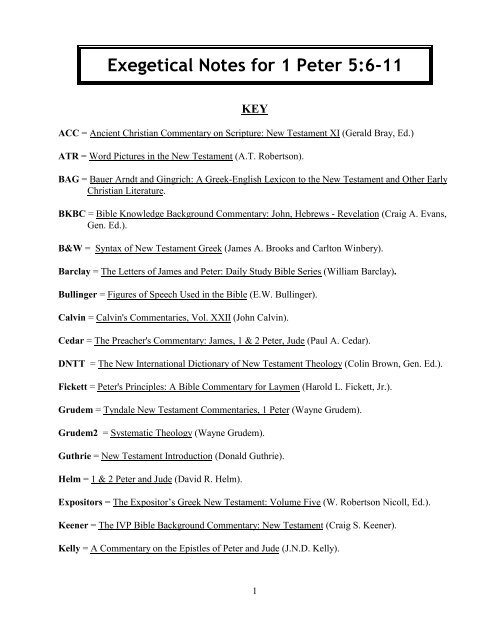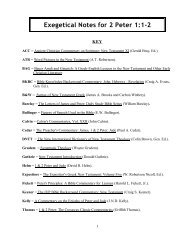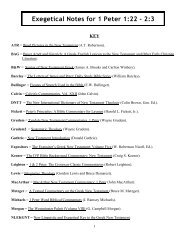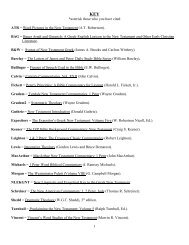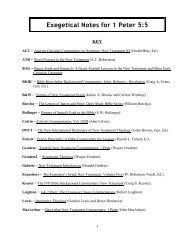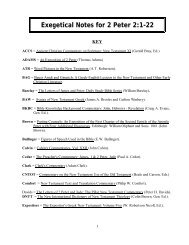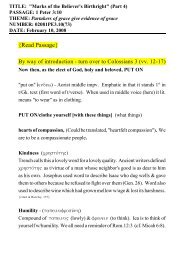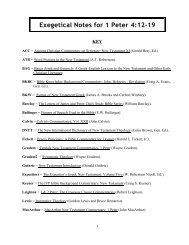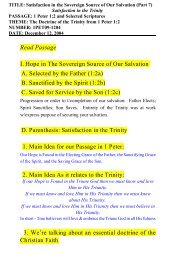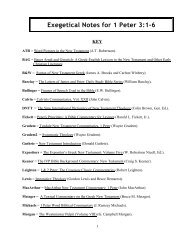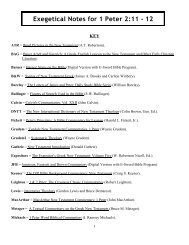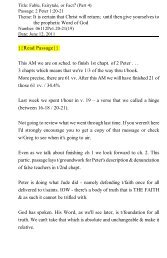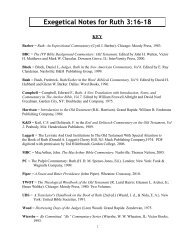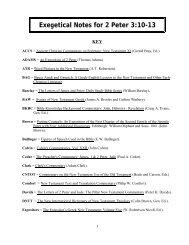Exegetical Notes for 1 Peter 5:6-11 - Tony Bartolucci
Exegetical Notes for 1 Peter 5:6-11 - Tony Bartolucci
Exegetical Notes for 1 Peter 5:6-11 - Tony Bartolucci
Create successful ePaper yourself
Turn your PDF publications into a flip-book with our unique Google optimized e-Paper software.
<strong>Exegetical</strong> <strong>Notes</strong> <strong>for</strong> 1 <strong>Peter</strong> 5:6-<strong>11</strong><br />
KEY<br />
ACC = Ancient Christian Commentary on Scripture: New Testament XI (Gerald Bray, Ed.)<br />
ATR = Word Pictures in the New Testament (A.T. Robertson).<br />
BAG = Bauer Arndt and Gingrich: A Greek-English Lexicon to the New Testament and Other Early<br />
Christian Literature.<br />
BKBC = Bible Knowledge Background Commentary: John, Hebrews - Revelation (Craig A. Evans,<br />
Gen. Ed.).<br />
B&W = Syntax of New Testament Greek (James A. Brooks and Carlton Winbery).<br />
Barclay = The Letters of James and <strong>Peter</strong>: Daily Study Bible Series (William Barclay).<br />
Bullinger = Figures of Speech Used in the Bible (E.W. Bullinger).<br />
Calvin = Calvin's Commentaries, Vol. XXII (John Calvin).<br />
Cedar = The Preacher's Commentary: James, 1 & 2 <strong>Peter</strong>, Jude (Paul A. Cedar).<br />
DNTT = The New International Dictionary of New Testament Theology (Colin Brown, Gen. Ed.).<br />
Fickett = <strong>Peter</strong>'s Principles: A Bible Commentary <strong>for</strong> Laymen (Harold L. Fickett, Jr.).<br />
Grudem = Tyndale New Testament Commentaries, 1 <strong>Peter</strong> (Wayne Grudem).<br />
Grudem2 = Systematic Theology (Wayne Grudem).<br />
Guthrie = New Testament Introduction (Donald Guthrie).<br />
Helm = 1 & 2 <strong>Peter</strong> and Jude (David R. Helm).<br />
Expositors = The Expositor’s Greek New Testament: Volume Five (W. Robertson Nicoll, Ed.).<br />
Keener = The IVP Bible Background Commentary: New Testament (Craig S. Keener).<br />
Kelly = A Commentary on the Epistles of <strong>Peter</strong> and Jude (J.N.D. Kelly).<br />
1
Leighton = 1 & 2 <strong>Peter</strong>: The Crossway Classic Commentaries (Robert Leighton).<br />
Linguistic Key = The Linguistic Key to the Greek New Testament.<br />
Lewis = Integrative Theology (Gordon Lewis and Bruce Demarest).<br />
Lenski = The Interpretation of I and II Epistles of <strong>Peter</strong>, the three Epistles of John, and the Epistle of<br />
Jude (R.C. Lenski).<br />
Luther = Commentary on <strong>Peter</strong> and Jude (Martin Luther).<br />
MacArthur = MacArthur New Testament Commentary: 1 <strong>Peter</strong> (John MacArthur).<br />
Maclaren = Expositions of Holy Scripture: 1 <strong>Peter</strong> (Alexander Maclaren).<br />
Metzger = A Textual Commentary on the Greek New Testament (Bruce M. Metzger).<br />
Michaels = 1 <strong>Peter</strong> Word Biblical Commentary (J. Ramsey Michaels).<br />
Morgan = The Westminster Pulpit (Volume VIII) (G. Campbell Morgan).<br />
NLEKGNT = New Linguistic and <strong>Exegetical</strong> Key to the Greek New Testament.<br />
Schreiner = The New American Commentary: 1, 2 <strong>Peter</strong>, Jude (Thomas R. Schreiner).<br />
rd<br />
Shedd = Dogmatic Theology (W.G.T. Shedd), 3 edition.<br />
Kittle = Theological Dictionary of the New Testament (G. Kittle and G. Friedrich, Eds.).<br />
Turnbull = Proclaiming the New Testament: Volume 5 (Ralph Turnbull, Ed.).<br />
Vincent = Vincent’s Word Studies of the New Testament (Marvin R. Vincent).<br />
Wuest = First <strong>Peter</strong> in the Greek New Testament (Kenneth S. Wuest).<br />
2
6<br />
����������������<br />
������������������������<br />
����������������<br />
������������������������<br />
�����������<br />
7<br />
v ��������������������������<br />
�����������������������<br />
���������������������������<br />
8<br />
�� ��������<br />
�������������<br />
������������������<br />
���������<br />
������������������<br />
�����������<br />
9<br />
Basic Diagram of 5:6-<strong>11</strong><br />
��������[�����]������������<br />
��� ������������ ��� ������������<br />
���������<br />
��� ����������� ��� ����� ��������.<br />
10 ���������������������������<br />
���������������������������������������������<br />
���������������������<br />
���������������<br />
��������������������������������������������������<br />
<strong>11</strong> ����������������������������������������<br />
3
6 Humble yourselves,<br />
there<strong>for</strong>e,<br />
under the mighty hand<br />
of God,<br />
so that He may lift you up<br />
in time:<br />
7 casting all your anxiety upon Him,<br />
<strong>for</strong> He cares <strong>for</strong> you.<br />
8 Be sober,<br />
be alert;<br />
your adversary,<br />
the Devil<br />
prowls about<br />
like a roaring lion<br />
seeking someone to devour.<br />
9 Resist him,<br />
firm in the faith,<br />
knowing<br />
that the same sufferings<br />
are being accomplished by your brethren<br />
in the world.<br />
10 �����And the God of all grace,<br />
the One who called you<br />
to His eternal glory<br />
in Christ,<br />
after you have suffered a little while,<br />
He will -perfect, -confirm, -strengthen, [and] -establish [you].<br />
<strong>11</strong> To Him<br />
be the dominion <strong>for</strong> all eternity. Amen!<br />
4
GREEK TEXT:<br />
TRANSLATION, OUTLINE AND CENTRAL PROPOSITION<br />
6 ���������������������������������� ������� ����� ������� ���� ������ ������ ��� �������� 7� ������<br />
���� ��������� ������ ������������ ���� �����������������������������������8��������<br />
�����������������������������������������������������������������������������������<br />
������������9���� ���������� �������� ���� ������� �������� ��� ����� ����� ���������� ���� ���������<br />
����������������������� ��������������� 10 ��������������������������� �� �������� ������ ���<br />
���� �������� ������� ������ ��� ������������������������������������������ ������������ ���������<br />
���������� ������������ <strong>11</strong>� ������ ��� ������� ���� ����� ��������� ������<br />
ENGLISH TRANSLATION:<br />
6 Humble yourselves, there<strong>for</strong>e, under the mighty hand of God, so that He may lift you up in time: 7<br />
casting all your anxiety upon Him, <strong>for</strong> He cares <strong>for</strong> you. 8 Be sober, be alert; your adversary, the Devil<br />
prowls about like a roaring lion seeking someone to devour. 9 Resist him, firm in the faith, knowing that<br />
the same sufferings are being accomplished by your brethren in the world. 10 And the God of all grace,<br />
the One who called you to His eternal glory in Christ, after you have suffered a little while, He will<br />
perfect, confirm, strengthen, [and] establish [you]. <strong>11</strong> To Him be the dominion <strong>for</strong> all eternity. Amen!<br />
PASSAGE OUTLINE:<br />
I. <strong>Peter</strong>'s Concluding Exhortations to the Saints (6-<strong>11</strong>)<br />
A. Running the Race with Endurance to the Finish (6-<strong>11</strong>)<br />
1. Be humble and not anxious (6-7)<br />
2. Recognize that the adversary seeks to destroy you (8-9)<br />
a. Be alert and sober (8)<br />
b. Resist Him (9)<br />
c. Be firm in the faith (9)<br />
d. Know that you are not alone in the fight (9)<br />
(1) Need <strong>for</strong> being in the life of the body<br />
3. We are called to suffering, not Ease (9-10)<br />
4. Keep your eyes on the prize to the end of the race (10)<br />
5. Remember that God is sovereign (<strong>11</strong>)<br />
INITIAL SERMON OUTLINE:<br />
I. <strong>Peter</strong>'s Concluding Exhortations to the Saints (6-<strong>11</strong>)<br />
A. A Checklist <strong>for</strong> Running the Race with Endurance to the Finish (6-<strong>11</strong>)<br />
1. Is your life marked by humility? (6)<br />
a. The relationship between humility and anxiety (7)<br />
2. Do you know you are being hunted by a powerful adversary? (8-9)<br />
a. Be alert and sober (8)<br />
b. Resist Him (9)<br />
c. Be firm in the faith (9)<br />
5
3. Are you trying to fight the fight alone? (9)<br />
(1) Need <strong>for</strong> being in the life of the body<br />
4. Are you grasping too tightly on the things of this world? (9-10)<br />
a. We are called to suffering, not ease<br />
5. Are you confident in God's care and call? (10-<strong>11</strong>)<br />
a. Keep your eyes on the prize (10)<br />
(1) Confidence in God's Grace and Call<br />
PASSAGE SUBJECT/THEME (what is the passage talking about): Persevering through suffering<br />
to the end<br />
PASSAGE COMPLEMENT/THRUST (what is the passage saying about what it’s talking about):<br />
by humbling ourselves be<strong>for</strong>e God, being alert to the wiles of the Adversary, resisting him, firm in the<br />
faith, knowing that the church is called to suffering, while being confident in God's care and call.<br />
PASSAGE MAIN IDEA (central proposition of the text):<br />
PURPOSE OF THE SERMON (on the basis of the CPT what does God want us to learn and do?):<br />
SERMON SUBJECT/THEME (what am I talking about):<br />
SERMON COMPLEMENT/THRUST (what am I saying about what I am talking about):<br />
INITIAL CENTRAL PROPOSITION OF THE SERMON: Humble dependence on God's sovereign<br />
will is that which carries us through the sufferings of this life to the finish line of faith.<br />
MEMORABLE CENTRAL PROPOSITION OF THE SERMON: "Humble dependence on God's<br />
sovereign will is that which carries us through the sufferings of this life to the finish line of faith."<br />
SERMONIC IDEA/TITLE: "Faithfully Fighting the 'Fight of Faith' to the Finish" (Part 1)<br />
FINAL SERMON OUTLINE:<br />
I. How to Persevere Through Suffering (6-<strong>11</strong>)<br />
A. Humble Yourself Be<strong>for</strong>e God (6-7)<br />
1. It is a Humility that Bows to God's Sovereignty (6)<br />
2. It is a Humility that Looks to Eternity (6)<br />
3. It is a Humility that Forsakes Worldly Anxiety (7)<br />
4. It is a Humility that Rests in God's Care (7)<br />
B. Be Aware of your Adversary (8-9)<br />
1. You are being hunted<br />
a. Don't Run, Resist!<br />
2. Stay firm in the faith: Guard Your Heart and Your Doctrine<br />
C. Know that you Don't Suffer Alone (9)<br />
1. Need <strong>for</strong> being in the life of the body<br />
D. Focus on the Finish Line of Faith (10-<strong>11</strong>)<br />
6
HISTORICAL/CULTURAL/GRAMMATICAL CONTEXT<br />
This section begins <strong>Peter</strong>'s concluding exhortations to the saints. JND Kelly notes that it consists of "<br />
loosely connected pieces of exhortation."<br />
"These six verses are most appropriately understood as <strong>Peter</strong>'s exposition of the text of Prov.<br />
3:34 LXX quoted in v 5b. James, in similar fashion, cites the same text in 4:6b and expounds it<br />
in 4:7-10. It is natural to explore the relationship between <strong>Peter</strong>'s use of the text and that of<br />
James. Is <strong>Peter</strong> dependent on James? James on <strong>Peter</strong>? Are both drawing on a common early<br />
Christian exegesis of Prov. 3:34? Or do the two have only the text itself in common?" [Michaels,<br />
293]<br />
1 <strong>Peter</strong> 4:5b-<strong>11</strong> (directed toward the suffering) James 4:6-10 (directed toward the apathetic)<br />
5b “God is opposed to the proud, but gives grace to the<br />
humble.”<br />
6 Humble yourselves, there<strong>for</strong>e, under the mighty hand<br />
of God, so that He may lift you up in time:<br />
7 casting all your anxiety upon Him, <strong>for</strong> He cares <strong>for</strong><br />
you.<br />
8 Be sober, be alert; your adversary, the Devil prowls<br />
about like a roaring lion seeking someone to devour. 9<br />
Resist him, firm in the faith, knowing that the same<br />
sufferings are being accomplished by your brethren in<br />
the world.<br />
10 And the God of all grace, the One who called you to<br />
His eternal glory in Christ, after you have suffered a<br />
little while, He will perfect, confirm, strengthen, [and]<br />
establish [you].<br />
<strong>11</strong> To Him be the dominion <strong>for</strong> all eternity. Amen!<br />
--------------------------------------<br />
--------------------------------------<br />
7<br />
6b “God is opposed to the proud, but gives grace to the<br />
humble.”<br />
10 Humble yourselves in the presence of the Lord, and<br />
He will exalt you.<br />
---------------------------------<br />
7 Submit there<strong>for</strong>e to God. Resist the devil and he will<br />
flee from you.<br />
--------------------------------------<br />
--------------------------------------<br />
8 Draw near to God and He will draw near to you.<br />
Cleanse your hands, you sinners; and purify your hearts,<br />
you double-minded.<br />
9 Be miserable and mourn and weep; let your laughter<br />
be turned into mourning, and your joy to gloom.<br />
Note <strong>Peter</strong>'s quote from the LXX which is nearly a direct citation with the exception of his substituting<br />
���� <strong>for</strong> ������.
Three Steps of Exegesis<br />
� Do an initial translation of the entire passage.<br />
� Do a detailed analysis of the grammar, working verse-by-verse to the end of the<br />
passage.<br />
� Do a detailed exegesis of the passage by way of a "shot-gun" approach, using all the<br />
exegetical tools.<br />
� In no particular order:<br />
�Work from critical commentaries to practical.<br />
�Word studies and cross-references (analogy of the faith).<br />
�Applicational analysis - applicational issues arising from the text.<br />
�Theological analysis - theological issues arising from the text.<br />
� "Blast away" at the passage until I am content with my exegesis, main idea,<br />
and outline.<br />
�Smooth away all of the wrinkles.<br />
�The process is to yield an accurate "statue" as I chisel away the debris.<br />
Parsing Verbs and Declining Nouns<br />
Verbs: ��������� (�������� = to tend, shepherd || Verb: Second Person<br />
Plural Aorist Imperative Active).<br />
�������������� (��������� = to reveal, disclose || Verb: Present<br />
Passive Infinitive).<br />
Nouns: ���������, (������ = suffering || Noun: Neuter Genitive Plural).<br />
Participles: ��������� (������= to be about to || Present Active Participle:<br />
Feminine Genitive Singular).<br />
Adjectives: (��������� = gentle, kind || Adjective: Masculine Dative Plural).<br />
Pronouns: (�����= I || First Person Independent Personal Pronoun: Nominative<br />
Singular)�<br />
���� (�� = you || Second Person Independent Personal Pronoun: Dative<br />
Plural).<br />
(������ = He, Him || Third Person Independent Personal Pronoun:<br />
Masculine Genitive Singular).<br />
(������= this || Near Demonstrative Pronoun: Neuter Nominative<br />
Singular).<br />
8
GREEK TEXT:<br />
5:6 EXEGESIS<br />
������������������������� ��������� ������� ����� ������� ���� ������ ������ ��� �������<br />
����������� (�������� = to humble || Verb: Second Person Plural First Aorist Passive Imperative).<br />
Imperative of command. Cf. Matt. 18:4.<br />
����������������������(�������� = powerful, mighty || Adjective: Feminine Accusative Singular).<br />
Cf. Eph. 1:19.<br />
�������(��������������= hand || Noun: Feminine Accusative Singular). Adverbial Accusative of Place.<br />
������������(�����|| Noun: Masculine Genitive Singular). Genitive of Possession. Cf. "hand of God"<br />
in Exo. 3:19; 20:33, etc.<br />
����������(�� = you || Second Person Independent Personal Pronoun: Accusative Plural).<br />
����� (�����= to lift up, exalt || Verb: Third Person Singular Aorist Active Subjunctive). Subjunctive<br />
of Result. Cf. Luke 14:<strong>11</strong>; Phil. 2:9.<br />
���������� (�������= time, season || Noun: Masculine Dative Singular). Dative/Locative of Time. Same<br />
phrase used in Matt. 24:45.<br />
ENGLISH TRANSLATION:<br />
Humble yourselves, there<strong>for</strong>e, under the mighty hand of God, so that He may lift you up in time:<br />
CONTEXTUAL, GRAMMATICAL, THEOLOGICAL, APPLICATIONAL ANALYSIS:<br />
Note the transition from v. 5 to v. 6<br />
You young men, likewise, be subject to your elders. And all of you clothe yourselves with<br />
humility toward one another, FOR GOD IS OPPOSED TO THE PROUD, BUT GIVES GRACE TO<br />
THE HUMBLE.<br />
THEN - <strong>Peter</strong> goes from humility as it relates to one another (horizontal) TO humility be<strong>for</strong>e God<br />
(vertical) ==><br />
Humble yourselves, there<strong>for</strong>e, under the mighty hand of God so that HE may lift you up<br />
in time: (or exalt you at t/proper time - NAS)<br />
<strong>Peter</strong> quotes here from Proverbs 3:34 ==><br />
Proverbs 3:34 (Hebrew) Though He scoffs at the scoffers, Yet He gives grace to the afflicted.<br />
Proverbs 3:34 (Greek LXX) The Lord resists the proud; but he gives grace to the humble.<br />
9
<strong>Peter</strong>'s quote is nearly ID to t/LXX except <strong>for</strong> one word: LXX uses t/word "Lord" (������) and <strong>Peter</strong><br />
substitutes t/word ���� (God). Every other word is identical in <strong>for</strong>m.<br />
Comparison to James ==><br />
1 <strong>Peter</strong> 4:5b-<strong>11</strong> (To the Suffering) James 4:6-10 (To the Apathetic)<br />
5b “God is opposed to the proud, but gives grace to the<br />
humble.”<br />
6 Humble yourselves, there<strong>for</strong>e, under the mighty hand of God,<br />
so that He may lift you up in time:<br />
7 casting all your anxiety upon Him, <strong>for</strong> He cares <strong>for</strong> you.<br />
8 Be sober, be alert; your adversary, the Devil prowls about like<br />
a roaring lion seeking someone to devour. 9 Resist him, firm<br />
in the faith, knowing that the same sufferings are being<br />
accomplished by your brethren in the world.<br />
10 And the God of all grace, the One who called you to His<br />
eternal glory in Christ, after you have suffered a little while, He<br />
will perfect, confirm, strengthen, [and] establish [you].<br />
<strong>11</strong> To Him be the dominion <strong>for</strong> all eternity. Amen!<br />
N/A - relates to the apathetic<br />
N/A - relates to the apathetic<br />
6b “God is opposed to the proud, but gives grace to the<br />
humble.”<br />
10 Humble yourselves in the presence of the Lord, and He will<br />
exalt you.<br />
10<br />
N/A - relates to the suffering<br />
7 Submit there<strong>for</strong>e to God. Resist the devil and he will flee from<br />
you.<br />
N/A - relates to the suffering<br />
N/A<br />
8 Draw near to God and He will draw near to you. Cleanse your<br />
hands, you sinners; and purify your hearts, you double-minded.<br />
9 Be miserable and mourn and weep; let your laughter be turned<br />
into mourning, and your joy to gloom.<br />
Interesting how two inspired authors apply the same passage to two different circumstances.<br />
As it relates to humility within <strong>Peter</strong>'s context – It's a humility that is characterized by 4 things ==><br />
Phrase "mighty hand of God" or "God's mighty hand" is an O.T. reference to 2 things: 1) God's<br />
dominion; 2) God's discipline. As it relates to God's dominion (sovereignty) his mighty hand is associated<br />
with the Exodus. As it relates to discipline – to be subject to God's hand or his "mighty hand" as we have<br />
it here is to submit to his judgment.<br />
Here we have a thread that goes back to 4:17 ==><br />
For [it is] time <strong>for</strong> judgement to begin from the house of God; and if [it begins] with us first, what will<br />
[be the] end of those who are disobedient to Gospel of God?
This judgement connects to verse 12 of chapter 4 "do not be surprised at the fiery ordeal among you"<br />
The F.O. is God's judgement. Suffering is one way that God purifies His Church.<br />
We see that t/o history. Suffering and persecution purify and grow t/CH. One of the early Romans<br />
spoke about how persecuting Xns only seemed to cause their movement to grow and flourish. Seems<br />
contra. You try to kill us // silence us // persecute us – it only makes us stronger.<br />
Both of those ideas (Dom. + Disc.) are encompassed in t/command that we must ==><br />
Humble [ourselves] . . . under God's mighty hand . . .<br />
It's a humility that bows to His sovereign control over all things, even our suffering.<br />
Be humble; place your heart in God's hands // w/humility receive His discipline. If you do, here's the<br />
promise ==><br />
... He [will] lift you up (or exalt you) in time (or in His timing) ...<br />
Ultimately, that time is eschatological. In other words, after you have finished t/course of this life and<br />
enter into the next.<br />
Interesting that MacArthur doesn't see this as an eternal promise per se, but as a temporal one. IOW -<br />
he contends that this is <strong>for</strong> the here and now. Humble yourself be<strong>for</strong>e God and He will exalt you in time<br />
during this life.<br />
I have to disagree - the phrase �������� (in time) is best understood as "the last time" or "the time of the<br />
end." This fits t/regular emphasis of <strong>Peter</strong> on t/final glorification of the believer.<br />
Humble yourselves, there<strong>for</strong>e (����������������)<br />
����������� (�������� = to humble || Verb: Second Person Plural First Aorist Passive Imperative).<br />
Imperative of command. Cf. Matt. 18:4.<br />
Note the interpretation K. Wuest takes:<br />
"The verb translated "humble yourselves" is not in the aorist middle but the passive voice, which<br />
means that the subject of the verb is passive in the hands of God and is acted upon by Him. The<br />
exhortation is, "Be humbled" or "Suffer yourselves to be humbled." The humbling process which<br />
God was using was the persecution and suffering through which these Christians s were passing.<br />
<strong>Peter</strong> exhorts these believers to react towards these in a God-honoring way, to be submissive to<br />
the discipline which God was using to make them more humble." [Wuest, 128]<br />
under the mighty hand of God, (����������������� ������� ����� ������)<br />
����� ���� ���� ��������� (�������� = powerful, mighty || Adjective: Feminine Accusative Singular).<br />
Cf. Eph. 1:19.<br />
<strong>11</strong>
������������������|| Noun: Masculine Genitive Singular). Genitive of Possession. Cf. "hand of God"<br />
in Exo. 3:19; 20:33, etc.<br />
God's absolute sovereignty and dominion (cf. v. <strong>11</strong>). This phrase often used in the OT - esp. of God's<br />
delivering his people from Egypt, Exo. 13:9; Deut. 3:24, 26:8, . The same power that delivered the Jews<br />
from Egyptian slavery is available to us to deliver us from the slavery of fear, pride, doubt.<br />
God's hand also signifies discipline (Exo. 3:20; Job 30:21; Psa. 32:4). This discipline would be in<br />
keeping with 4:17. We must humble ourselves under his hand of discipline and in keeping w/His sov.<br />
will.<br />
You cannot strive against God's sovereign will. All things bow to Him and Him alone. He does as He<br />
pleases.<br />
Cf. Nebuchadnezzar in Daniel 4.<br />
The kind of humility that bows to God's sovereignty is also the only way that we can ultimately be<br />
delivered from our affliction.<br />
so that He may lift you up in time: (���������������� ��� �������)<br />
���� ������ (�� = you || Second Person Independent Personal Pronoun: Accusative Plural).<br />
������������= to lift up, exalt || Verb: Third Person Singular Aorist Active Subjunctive). Subjunctive<br />
of Result. Cf. Luke 14:<strong>11</strong>; Phil. 2:9.<br />
�������������������= time, season || Noun: Masculine Dative Singular). Dative/Locative of Time. Same<br />
phrase used in Matt. 24:45.<br />
Note MacArthur doesn't believe this to be an eschatological term. However, see Kelly (page 208):<br />
". . . and this will be brought about at the appointed time. This expression paraphrases the<br />
enigmatic en kairoi (lit. 'in time'), which in classical Greek can mean (e.g. Thucydides, Hist. iv.<br />
59; vi. 9) 'at the opportune time' or (e.g. ib. i. 121) 'in our good time'). But in the N.T. ho kairos<br />
acquires eschatological overtones, meaning 'the time of crisis', 'the last time', 'the time of the End'<br />
(e.g. Mt. viii. 29; Mk. xiii. 33; Lk. xxi. 8; i Cor. iv. 5). This is clearly its <strong>for</strong>ce here; it is equivalent<br />
to 'in the last time' (en kairoi eschatoi) of i. 5, i.e. the time of the Parousia, and indeed in some<br />
MSS it is glossed by the insertion (after ii. 12) of 'of visitation' (episkopes)."<br />
"Exaltation to Come. Chrysostom: "<strong>Peter</strong> says that this will happen in due time, because he is<br />
teaching them that they will have to wait until the next life <strong>for</strong> this exaltation." [Catena]<br />
"The early apocryphal manuscript known as The Acts of <strong>Peter</strong> was the first to purport that the<br />
apostle's death came by inverted crucifixion. By the close of the second century Tertullian held<br />
the same view, and, in agreement, Origen is recorded as saying, '<strong>Peter</strong> was crucified at Rome with<br />
his d downwards, as he had desired to suffer.' Later Saint Jerome set his approval on this view,<br />
12
and eventually Michelangelo painted it into stone in a chapel at the Vatican. Tradition is fixed —<br />
<strong>Peter</strong> was martyred by inverted crucifixion. If this is true, than we can say that <strong>Peter</strong>'s long hoped<br />
<strong>for</strong> exaltation — his entrance into eternal glory — came after one brief and final season of human<br />
humiliation. In the end, <strong>for</strong> the Apostle <strong>Peter</strong>, Heaven's inheritance (1:4) was gained only after<br />
being crucified head downward upon the earth." [Helm, 167]<br />
This suffering to hope is what we also noted in chapter 1:5 ff. Again, following the familiar theme of<br />
suffering to glory, or humiliation must come be<strong>for</strong>e exaltation (as in the case of our Lord). Cf. this theme<br />
t/o 1 <strong>Peter</strong> and esp. in 5:6 and 5:10.<br />
"In due time. This is not the time that suits you, but God's wisely appointed time. You think, 'I<br />
am sinking; if God does not help me now, it will be too late.' But God sees it differently. He can<br />
let you sink still lower and bring you up again. He only acts at the most appropriate time. You<br />
cannot see this now, but you will see someday that God has chosen the best time. 'Yet the LORD<br />
longs to be gracious to you; he rises to show you compassion. For the LORD is a God of justice.<br />
Blessed are all who wait <strong>for</strong> him' (Isaiah 30:18). Does God wait and you do not? What difficulty<br />
cannot firm belief in God's wisdom, power, and goodness surmount? So be humble under his<br />
hand. Submit not only your possessions, your health, your life, but your soul as well. Seek and<br />
wait <strong>for</strong> your pardon as a condemned rebel, with the rope around your neck. Lay yourself low<br />
be<strong>for</strong>e God, stoop at his feet, and ask permission to say, 'Lord, I am justly under the sentence of<br />
death. If I fall under it, you are righteous, and I do now acknowledge this. But if it seems good<br />
to you to save the vilest, most wretched of sinners, and to show great mercy in pardoning such<br />
a debt, the higher will be the glory of that mercy. However, I am resolved to wait until either you<br />
graciously receive me or absolutely reject me. If you do the latter, I do not have a word to say<br />
against it; but because you are gracious, I hope that you will yet have mercy on me.' I dare say<br />
that the promise in the text belongs to such a soul, and he may lift you up in due time." [Robert<br />
Leighton, 233]<br />
"What if most or all of our life passes without feeling any spiritual com<strong>for</strong>t? Let us not<br />
overestimate this moment. Provided we can humbly wait <strong>for</strong> free grace and depend on the word<br />
of promise, we are safe. If the Lord will clearly shine on us and refresh us, this is much to be<br />
desired and prized. But what if he thinks it fit that we should be under a cloud of wrath all our<br />
days? It is but a moment. 'For his anger lasts only a moment, but his favor lasts a lifetime;<br />
weeping may remain <strong>for</strong> a night, but rejoicing comes in the morning' (Psalm 30:5). What follows<br />
a lifetime of his favor is an endless lifetime. No evening follows the morning of eternity." [Ibid]<br />
<strong>Peter</strong> has in mind the time 'when Jesus Christ is revealed' (1:7,13), or when 'the chief shepherd appears'<br />
(v. 4), i.e. the 'end of all things (4:7). Cf. Michaels' grammatical argument <strong>for</strong> this being eschatological<br />
(Michaels, 296).<br />
Note that exaltation is God's timing, not ours. This can apply to temporal situations (examples) or<br />
ultimately, eternal ones (where all of God's elect are exalted). Note the example of Jesus in<br />
Gethsemane.<br />
13
EXO 3:19 "But I know that the king of Egypt will not permit you to go, except under<br />
compulsion.<br />
EXO 10:3 And Moses and Aaron went to Pharaoh and said to him, "Thus says the \Lord,\ the<br />
God of the Hebrews, 'How long will you refuse to humble yourself be<strong>for</strong>e Me? Let My people<br />
go, that they may serve Me.<br />
1KI 21:29 "Do you see how Ahab has humbled himself be<strong>for</strong>e Me? Because he has humbled<br />
himself be<strong>for</strong>e Me, I will not bring the evil in his days, {but} I will bring the evil upon his house<br />
in his son's days."<br />
2KI 22:19 because your heart was tender and you humbled yourself be<strong>for</strong>e the \Lord\ when you<br />
heard what I spoke against this place and against its inhabitants that they should become a<br />
desolation and a curse, and you have torn your clothes and wept be<strong>for</strong>e Me, I truly have heard<br />
you, "declares the \Lord.\<br />
2CH 12:6-7, 12 6 So the princes of Israel and the king humbled themselves and said, "The \Lord\<br />
is righteous." 7 And when the \Lord\ saw that they humbled themselves, the word of the \Lord\<br />
came to Shemaiah, saying, "They have humbled themselves so I will not destroy them, but I will<br />
grant them some {measure} of deliverance, and My wrath shall not be poured out on Jerusalem<br />
by means of Shishak. 12 And when he humbled himself, the anger of the \Lord\ turned away from<br />
him, so as not to destroy {him} completely; and also conditions were good in Judah.<br />
2CH 30:<strong>11</strong> Nevertheless some men of Asher, Manasseh, and Zebulun humbled themselves and<br />
came to Jerusalem.<br />
2CH 32:26 However, Hezekiah humbled the pride of his heart, both he and the inhabitants of<br />
Jerusalem, so that the wrath of the \Lord\ did not come on them in the days of Hezekiah.<br />
2CH 33:12 And when he was in distress, he entreated the \Lord\ his God and humbled himself<br />
greatly be<strong>for</strong>e the God of his fathers.<br />
2CH 33:19 His prayer also and {how God} was entreated by him, and all his sin, his<br />
unfaithfulness, and the sites on which he built high places and erected the Asherim and the carved<br />
images, be<strong>for</strong>e he humbled himself, behold, they are written in the records of the Hozai.<br />
2CH 33:23 Moreover, he did not humble himself be<strong>for</strong>e the \Lord\ as his father Manasseh had<br />
done, but Amon multiplied guilt.<br />
PRO 29:23 A man's pride will bring him low, But a humble spirit will obtain honor.<br />
ISA 57:15 For thus says the high and exalted One Who lives <strong>for</strong>ever, whose name is Holy, "I<br />
dwell {on} a high and holy place, And {also} with the contrite and lowly of spirit In order to<br />
revive the spirit of the lowly And to revive the heart of the contrite.<br />
14
MIC 6:8 He has told you, O man, what is good; And what does the \Lord\ require of you But to<br />
do justice, to love kindness, And to walk humbly with your God?<br />
MAT 23:12 "And whoever exalts himself shall be humbled; and whoever humbles himself shall<br />
be exalted.<br />
LUK 1:52 "He has brought down rulers from {their} thrones, And has exalted those who were<br />
humble.<br />
LUK 14:<strong>11</strong> "For everyone who exalts himself shall be humbled, and he who humbles himself shall<br />
be exalted."<br />
LUK 18:14 "I tell you, this man went down to his house justified rather than the other; <strong>for</strong><br />
everyone who exalts himself shall be humbled, but he who humbles himself shall be exalted."<br />
JAM 1:9-10 But let the brother of humble circumstances glory in his high position; and {let} the<br />
rich man {glory} in his humiliation, because like flowering grass he will pass away.<br />
JAM 4:10 Humble yourselves in the presence of the Lord, and He will exalt you.<br />
15
GREEK TEXT:<br />
5:7 EXEGESIS<br />
����������� ��������� ������ ������������ ���� ������� ���� ������ ������ ����� ������<br />
������ (�������������� = all, every || Adjective: Feminine Accusative Singular).<br />
�������������(�������� = anxiety, worry, care || Noun: Feminine Accusative Singular). Accusative<br />
of Direct Object.<br />
������(�� = you || Second Person Independent Personal Pronoun: Genitive Plural).<br />
������������(���������= to cast upon, throw || Participle: Nominative Masculine Plural Aorist Active).<br />
Imperative of means. "Although treated as an independent command in several modern<br />
translations . . . the participle should be connected with the verb of v 6, �����������. As such,<br />
it is not offering a new command, but is defining how believers are to humble themselves. Taking<br />
the participle as means enriches our understanding of both verbs: Humbling oneself is not a<br />
negative act of self-denial per se, but a positive one of active dependence on God <strong>for</strong> help."<br />
[Daniel Wallace, Greek Grammar, 630, cf. 340] The word is only used here and in Luke 19:35,<br />
of casting garments upon a colt.<br />
��������� (������= he, him || Third Person Independent Personal Pronoun Masculine Accusative<br />
Singular).<br />
����������(������= he, him || Third Person Independent Personal Pronoun Masculine Dative Singular).<br />
������(����� = singular of ���� used impers. it is a care || Verb: Third Person Singular Present Indicative<br />
Active). Descriptive Present. God does care. Cf. Luke 21:18.<br />
���������� (�� = you || Second Person Independent Personal Pronoun: Genitive Plural).<br />
ENGLISH TRANSLATION:<br />
casting all your anxiety upon Him, <strong>for</strong> He cares <strong>for</strong> you.<br />
CONTEXTUAL, GRAMMATICAL, THEOLOGICAL, APPLICATIONAL ANALYSIS:<br />
casting all your anxiety upon Him, (����������� ��������� ������ ������������ ���� ������)<br />
���� ��������� (�������� = anxiety, worry, care || Noun: Feminine Accusative Singular). Accusative<br />
of Direct Object.<br />
merimná�, promerimná�, mérimna. 1. Greek Usage. This group covers much the same range of<br />
meaning as the English “care”: a. “to care <strong>for</strong> someone or something,” b. “to be concerned or<br />
anxious,” c. “to be intent on or strive after,” d. “to be anxiously expectant,” e. “to be solicitous,”<br />
and f. “to brood, speculate, or inquire.” The plural mérimnai is often used <strong>for</strong> the cares of life<br />
which disturb sleep, from which refuge is sought in love or drink, and which only death can end.<br />
2. Hellenistic Jewish Use. The group is used in the LXX <strong>for</strong> intentness, <strong>for</strong> pondering, and <strong>for</strong><br />
16
anxiety or anxious care. Only Ps. 55:22 has theological significance. Philo and Josephus do not<br />
use the group.<br />
3. The N.T. a. mérimna and merimnán occur several times in the NT but only rarely in post-NT<br />
works. The usual Greek meanings are to be found, e.g, caring <strong>for</strong> in Mt. 6:25ff., intentness in Mt.<br />
6:31, anxiety in 1 Pet. 5:7, sorrow in Lk. 8:14, and pondering in Mt. 10:19.<br />
b. The NT realizes that life is swayed by care. Concern is unavoidable but it is given a new<br />
orientation. Liberation from it comes as one casts it upon God, not because God grants every<br />
wish, but because prayer grants freedom from care. To be anxious about food or clothing is<br />
opposed to concern <strong>for</strong> the kingdom of God (Mt. 6:26ff.). Naturally we have to work (1 Th. 2:9<br />
etc.), but we cannot secure life by care; our concern must be <strong>for</strong> the kingdom. To care <strong>for</strong> the<br />
world is to fall victim to it. If care gains control over us, it leads to apostasy (Lk. 21:34). We<br />
must focus on the one thing needful (Lk. 10:41-42), confronting worldly ties with a h�s m (1 Cor.<br />
7:29ff.). We belong to the coming aeon and must be ready <strong>for</strong> it (Lk. 21:34). But this entails care<br />
<strong>for</strong> others as members of the same body (1 Cor. 12:25).<br />
c. In Mt. 6:25ff. merimnán is self-concern relative to the future. The questions show that worry<br />
is what is meant. It is this that makes a proper concern foolish by fostering the illusion that<br />
concern <strong>for</strong> the means of life can grant security to life itself. The future is not in our hands. We<br />
cannot add one cubit (either length of days or stature) by worrying. The right course is to seek<br />
first the kingdom, and God will see to other things, not removing uncertainty, but taking the<br />
worry out of it. A bit of secular wisdom drives home the point in home in v. 34. It is ridiculous<br />
to add tomorrow’s worry to that of today. [Kittle, abridged]<br />
"Distraction" - Cf. Martha in Luke 10:41.<br />
����������������������= to cast upon, throw || Participle: Nominative Masculine Plural Aorist Active).<br />
Imperative of means. "Although treated as an independent command in several modern<br />
translations . . . the participle should be connected with the verb of v 6, �����������. As such,<br />
it is not offering a new command, but is defining how believers are to humble themselves. Taking<br />
the participle as means enriches our understanding of both verbs: Humbling oneself is not a<br />
negative act of self-denial per se, but a positive one of active dependence on God <strong>for</strong> help."<br />
[Daniel Wallace, Greek Grammar, 630, cf. 340] The word is only used here and in Luke 19:35,<br />
of casting garments upon a colt.<br />
Cf. Michaels who translates the verse: "All your anxiety you may throw on him, <strong>for</strong> he cares about you."<br />
[296]<br />
Translation of the participle as "casting" (NASB) over that of "cast" (NIV).<br />
How is anxiety a <strong>for</strong>m of pride:<br />
"Worry is a <strong>for</strong>m of pride because when believers are filled with anxiety, they are convinced that<br />
they must solve all the problems in their lives in their own strength. The only god they trust in is<br />
themselves. When believers throw their worries upon God, they express their trust in his mighty<br />
hand, acknowledging that he is Lord and Sovereign over all of life. As Goppelt says, 'Affliction<br />
either moves one into the arms of God or severs one from God.'" [Schreiner, 241]<br />
17
<strong>Peter</strong> probably had in mind Psalm 55:22: Cast your burden upon the \Lord,\ and He will sustain you; He<br />
will never allow the righteous to be shaken. Note that the word <strong>for</strong> 'burden' in Psalm 55:22 (LXX<br />
54:23) is the same word translated 'anxieties' here.<br />
What about the issue of today's near-epidemic of anxiety disorders? Panic attacks? Generalized anxiety?<br />
To follow Wuest's line of argumentation (taken from his interpretation of humility in verse 6):<br />
"The apostle exhorts them that while this humbling process is going on, they should cast all their<br />
care upon God. The word "care" is the translation of a Greek word which means "anxiety" or<br />
"worry." The word "all" in the Greek text has the idea, not of every worry that comes along, but<br />
the whole of their worries. They are to cast upon God the whole of worries, that is, come to the<br />
place where they resolve to cast the whole of their future worries upon Him. . . . "Anxiety is a<br />
self-contradiction to true humility. Unbelief is, in a sense, an exalting of self against God in that<br />
one is depending upon self and failing to trust God. Why worry there<strong>for</strong>e, if we are His concern.<br />
He is more concerned about our welfare than we could possibly be." [Wuest, 128-29]<br />
Note the connection between humbling oneself and anxiety. What does anxiety have to do with pride?<br />
What about general anxiety? There is anxiety that is sinful and rebellious. But there is also anxiety that<br />
is part of our fallen nature, our frame. Then there is anxiety that is unavoidable. It reacts to perceived<br />
danger. Not all who are anxious are sinning and not all who are anxious are sinning to the same extent.<br />
God knows each one of us and what areas we are weak in and what areas we are strong in. My concern<br />
with some nouthetic counseling / my background with panic attacks / anxiety / depression. Cf. Calvin<br />
and Spurgeon who suffered from same.<br />
When and where is it sinful? How does someone prone to it overcome it. We cast our anxieties on<br />
him, note this, "because he cares <strong>for</strong> us." We need to be sure it's not of pride/selfish independence.<br />
Note the increase in anxiety today that runs parallel to the increased godlessness of our society. German<br />
angst.<br />
Context of persecution and suffering <strong>for</strong> <strong>Peter</strong>'s readers.<br />
Bunyan's 'Pilgrim' who upon coming in his journey to the cross of Christ, found that his heavy burden fell<br />
off of his back. It is the anxieties of this world that cause the word to be unfruitful (Matt. 13:22).<br />
IOW - Anxiety is a <strong>for</strong>m of pride. This phrase ==><br />
casting all your anxiety upon Him . . .<br />
must be understood in connection w/humility. That's t/context. This is HOW we are to humble ourselves<br />
B4 God: By <strong>for</strong>saking our anxieties.<br />
a. Anxiety or Worry can be a subtle <strong>for</strong>m of idolatry<br />
It's to deny God's rightful place as Sov. Lord of t/Universe.<br />
18
It's to say, "I don't really trust that you're in control and that you are working all things <strong>for</strong> good in my<br />
life."<br />
Note that this isn't a "God helps those who help themselves" sort of thing (BTW - that little cliche is bad<br />
theology - unless you use it at the dinner table or when reaching <strong>for</strong> t/cookie jar!).<br />
This isn't like me saying, "Throw that in the garbage" and then I don't provide you with a garbage can!<br />
This isn't God saying, "Don't be anxious." Just stop it! Don't do it." Or, You may be anxious, but just<br />
deny that you really are. "What? Me Worry?!" I'm not worrying" (as you pace t/floor & devour<br />
t/Rolaids as if they were buttered popcorn!).<br />
Humble yourselves . . . under the mighty hand of God . . . casting all your anxiety . . . WHERE?<br />
==> upon Him . . .<br />
Give it to Him. He's provided t/means to winning over worry ==> Humble yourself by giving Him all your<br />
worries ==><br />
<strong>for</strong> He cares <strong>for</strong> you. (��������������������� �����.)<br />
���� ������ (������ = he, him || Third Person Independent Personal Pronoun Masculine Dative Singular).<br />
������������ = singular of ���� used impers. it is a care || Verb: Third Person Singular Present Indicative<br />
Active). Descriptive Present. God does care. Cf. Luke 21:18.<br />
�������������� = you || Second Person Independent Personal Pronoun: Genitive Plural).<br />
Trust element in beating anxiety. Do we believe that God cares <strong>for</strong> us?<br />
"O You Who are good and almighty, You Who care <strong>for</strong> one of us as <strong>for</strong> one, and <strong>for</strong> all of us as<br />
<strong>for</strong> each." [Augustine, Confessions, iii.II.19]<br />
That's Romans 8:32.<br />
John Calvin, himself prone to anxiety, wrote ==> “Those who are extremely anxious, wear themselves<br />
out and become their own executioners.”<br />
I know what that's like. I can testify that there is nothing worse that being plagued by anxiety. It<br />
imprisons you w/i a jail which is your mind. I know what it's like to suffer from depression (which is<br />
bad). But suffering from anxiety is worse. If you're depressed you usually can usually escape it at least<br />
w/sleep. Anxiety can be like your shadow.<br />
There are different kinds of anxiety. Some are quite normal. If your car breaks down on Saturday night<br />
in a bad neighborhood it would be expected that you be anxious.<br />
I suffer from panic attacks – something I've had to deal w/my entire life. I believe there are genetic or<br />
medical factors (family history). That's a result of living in a fallen world.<br />
19
There are those that are more prone to worry and those who are less prone to worry. Some women can<br />
find a lump in their breast and stay very calm. Others go to pieces. But that same person who goes to<br />
pieces may have little temptations in another areas that the unflappable person struggles with. We have<br />
weaknesses at different places in our armor. I might be weak in one place where you're not; vice-versa.<br />
However, <strong>for</strong> all of us there is a place where our anxieties cross a line from weakness to sinfulness.<br />
There's a place where we are really just refusing to trust God. We refuse to cast our anxieties upon Him<br />
because we don't really believe that He cares <strong>for</strong> us.<br />
But don't give up . . . As one writer notes ==><br />
"Hope and peace don't come without a fight. God is pleased to work hope and peace in us surely but<br />
gradually. They come as we mediate, feed on Scripture, feed on Christ, and keep calling out <strong>for</strong> manna<br />
and grace. The kingdom of God advances through weakness and dependence on the King, not through<br />
quick and bloodless victories. If you are feeling a bit weak, you are probably on the right path."<br />
He continues ==><br />
Essential to this battle with fear and anxiety is the gift of humility. . . . In our anxieties we are usually<br />
concerned about things we love [includes not only our com<strong>for</strong>ts, but our loved ones, TAB]. We want<br />
control. We want to take maters into our own hands to protect our future, but we are finding that it is<br />
impossible to manage all possible contingencies. We want to protect our kingdom. Find anxiety and you<br />
often find that your agenda is more important to you than God's. You might find that you adopt your own<br />
interpretation of God's world rather that submit to God's clear words about His power, love, and care."<br />
[Ed Welch, Tabletalk, January, 2010, page 23]<br />
Andrew Murray, the noted South African pastor, upon facing a tremendous time of suffering, penned into<br />
his journal these wise words: First, [God] brought me here, it is by His will that I am in this strait place:<br />
in that fact I will rest. Next, He will keep me here in His love, and give me grace to behave as His child.<br />
Then, He will make the trial a blessing, teaching me the lessons He intends me to learn, and working in<br />
me the grace He means to bestow. Last, in His good time He can bring me out again—how and when<br />
He knows. [There<strong>for</strong>e,] Let me say I am here, (1) By God’s appointment; (2) In His keeping; (3) Under<br />
His training; (4) For His time.<br />
PSA 56:3 When I am afraid, I will put my trust in Thee.<br />
MAT 6:25-26,33-34 25 "For this reason I say to you, do not be anxious <strong>for</strong> your life, {as to}<br />
what you shall eat, or what you shall drink; nor <strong>for</strong> your body, {as to} what you shall put on. Is<br />
not life more than food, and the body than clothing? 26 "Look at the birds of the air, that they do<br />
not sow, neither do they reap, nor gather into barns, and {yet} your heavenly Father feeds them.<br />
Are you not worth much more than they? 33 "But seek first His kingdom and His righteousness;<br />
and all these things shall be added to you. 34 "There<strong>for</strong>e do not be anxious <strong>for</strong> tomorrow; <strong>for</strong><br />
tomorrow will care <strong>for</strong> itself. {Each} day has enough trouble of its own.<br />
PHI 4:6 Be anxious <strong>for</strong> nothing, but in everything by prayer and supplication with thanksgiving<br />
let your requests be made known to God.<br />
20
GREEK TEXT:<br />
5:8 EXEGESIS<br />
��������������������������������������� ��������� ��� ����� ���������� ����������� ������<br />
[�����]� �����������<br />
�������� (���� = to be sober || Verb: Second Person Plural Present Imperative Active). Descriptive<br />
Present. Imperative of Command.<br />
����������� (�������� = to keep awake, be watchful || Verb: Second Person Plural Present<br />
Imperative Active). Descriptive Present. Imperative of Command. From ������, "to arouse," as<br />
in Matt. 24:42.<br />
�� ��������� (��������� = adversary || Noun: Masculine Nominative Singular). Nominative of<br />
Appellation. This was an old word from the courts used of an opponent in a lawsuit.<br />
����� (�� = you || Second Person Independent Personal Pronoun: Genitive Plural).<br />
�������� (�������� = devil, Devil || Noun: Masculine Nominative Singular). Monadic noun (see<br />
Wallace, 249). Nominative of Appellation.<br />
��� (���= "a comparative particle, indicating the manner in which proceeds as, like" || Comparative<br />
Particle).<br />
���� (���� = lion || Noun: Masculine Nominative Singular). Predicate Nominative?<br />
��������� (��������= to roar, howl || Present Middle Participle, Masculine Nominative Singular).<br />
Adverbial-Modal Participle. Descriptive Present.<br />
���������� (����������= to walk around || Verb: Third Person Singular Present Indicative Active).<br />
Descriptive Present.<br />
������ (������= to seek || Present Active Participle, Masculine Nominative Singular). Adverbial-Modal<br />
Participle. Descriptive Present. Note that he is roaring and roaming. Satan roars at the saints.<br />
Cf. Luke 22:31.<br />
[�����]������������ (����������= to devour, swallow up || Verb: Aorist Infinitive Active). Infinitive of<br />
Purpose ("in order to devour them" or "<strong>for</strong> the purpose of devouring them"). Lit. "to drink<br />
down" picturing an animal swallowing its prey. Cf. Jonah 2:1.<br />
ENGLISH TRANSLATION:<br />
Be sober, be alert; your adversary, the Devil prowls about like a roaring lion seeking someone to<br />
devour.<br />
CONTEXTUAL, GRAMMATICAL, THEOLOGICAL, APPLICATIONAL ANALYSIS:<br />
Be sober, be alert; (��������������������)<br />
21
That first point relates to trusting God. But this doesn't mean we don't have to act. We may know that<br />
God has ordained the length of our lives, but that doesn't mean we don't' wear our seatbelts!<br />
As Cromwell was reported to have said to his toops: "Trust in God, and keep your powder dry."<br />
While we are to entrust ourselves to God and His sovereign care, we also must be diligent ourselves. We<br />
may know that God has ordained the length of our lives, but that doesn't mean we don't' wear our<br />
seatbelts! As Cromwell was reported to have said to his toops: "Trust in God, and keep your powder<br />
dry."<br />
��������(���� = to be sober || Verb: Second Person Plural Present Imperative Active). Descriptive<br />
Present. Imperative of Command.<br />
��������������������� = to keep awake, be watchful || Verb: Second Person Plural Present<br />
Imperative Active). Descriptive Present. Imperative of Command. From ������, "to arouse," as<br />
in Matt. 24:42.<br />
The phrase is often used of being ready <strong>for</strong> the last day (see Mark 13:35,37; 1 Thess. 5:6-8; Rev. 3:2).<br />
Here used to alert the believers to the activity of Satan.<br />
He first emerges in Job 1-2 as the prosecutor in God's court (see Job 1:7; in the Greek version, he is<br />
called the diabolos, as here). He initiates the testing of the sincerity of God's siants, a role he retains here<br />
(as in Luke 22:31), or brings accusations against them be<strong>for</strong>e God (as in Zech. 3:1-2). the result that<br />
"Satan" becomes the archenemy of God, the leader of a revolt in heaven, who is himself expelled from<br />
God's court (Luke 10:18; Rev 12:9). Even so, he tries to turn them from the path of righteousness and<br />
obedience (as in Matt. 4:1-<strong>11</strong>); Satan is also behind the "tests" of Rev 2:10).<br />
Be mentally self-controlled. Cf. 1:13. Alert/awake. Not slumbering. Why?<br />
Note <strong>Peter</strong>'s words (two present imperatives) ==> These two words complement one another.<br />
We saw t/same word <strong>for</strong> "sober" (Gk. verb ����) in 1:13 and 4:7.<br />
1:13 There<strong>for</strong>e, gird your minds <strong>for</strong> action, keep sober in spirit, fix your hope completely on the grace<br />
to be brought to you at the revelation of Jesus Christ.<br />
4:7 The end of all things is at hand; there<strong>for</strong>e, be of sound judgment and sober spirit <strong>for</strong> the purpose of<br />
prayer.<br />
Second word translated ==> "be alert" Is often used of watchfulness or being ready <strong>for</strong> t/Lord's return.<br />
Matthew 24:42 “. . . be on the alert, <strong>for</strong> you do not know which day your Lord is coming."<br />
Those who have been in t/military (& those who k now anything about warfare) realize how important<br />
being alert is, not only <strong>for</strong> your own safety, but <strong>for</strong> t/safety of your fellow soldiers.<br />
Historically, falling asleep on guard duty was one of a soldier's worst poss. offenses. Many dreaded<br />
guard duty.<br />
22
Some Gk. MSS add the word "because" {state} - that's just to clarify what's there.<br />
Here the Devil, himself a fallen angel and t/commanding general of all demonic <strong>for</strong>ces, here he is called<br />
����������� == "THE adversary."<br />
��������� == an old word from the law courts that was used one's opponent in a lawsuit. It is to be<br />
t/accuser.<br />
Word �������� = in ancient Greek = 'to slander, accuse, or defame.'<br />
So even his name �������� speaks of his desire to accuse and oppose.<br />
your adversary, the Devil (��������������������������)<br />
�� ��������� (��������� = adversary || Noun: Masculine Nominative Singular). Nominative of<br />
Appellation. This was an old word from the courts used of an opponent in a lawsuit.<br />
������������������ = devil, Devil || Noun: Masculine Nominative Singular). Monadic noun (see<br />
Wallace, 249). Nominative of Appellation. ��� + ����� = "to throw over, to throw across, to<br />
send over." "It was used in classical Greek with the meanings, 'to traduce, calumniate, slander,<br />
accuse, defame,' and was used not only of those who bring a false charge against one, and do so<br />
maliciously, insidiously, with hostility. All that, the devil is in his character and inn his actions<br />
against the saints." [Wuest, 129]<br />
"Jewish teachers recognized that, as in the book of Job . . . Satan N.T. sought in this present age<br />
to turn people to apostasy from the truth, although his power was limited because he ultimately<br />
had to answer to God. The Dead Sea Scrolls called the present evil age the 'dominion of Satan.'"<br />
[Keener, Bible Background Commentary, 721-22]<br />
prowls about like a roaring lion (������������������ ����������)<br />
��� (���= "a comparative particle, indicating the manner in which proceeds as, like" || Comparative<br />
Particle).<br />
���������� = lion || Noun: Masculine Nominative Singular). Predicate Nominative?<br />
�������������������= to roar, howl || Present Middle Participle, Masculine Nominative Singular).<br />
Adverbial-Modal Participle. Descriptive Present.<br />
����������������������= to walk around || Verb: Third Person Singular Present Indicative Active).<br />
Descriptive Present.<br />
JOB Chapter 1 ==> Satan comes be<strong>for</strong>e the Lord who asks him "From where do you come?" Then Satan<br />
answers: "From roaming about on the earth & walking around on it." We see that same Q&A repeated<br />
in 2:2.<br />
23
. . . seeking someone to devour. (�������[�����������������)<br />
������ (������= to seek || Present Active Participle, Masculine Nominative Singular). Adverbial-Modal<br />
Participle. Descriptive Present. Note that he is roaring and roaming. Satan roars at the saints.<br />
Cf. Luke 22:31.<br />
[�����]������������������������= to devour, swallow up || Verb: Aorist Infinitive Active). Infinitive of<br />
Purpose ("in order to devour them" or "<strong>for</strong> the purpose of devouring them"). Lit. "to drink<br />
down" picturing an animal swallowing its prey. Cf. Jonah 2:1.<br />
How <strong>Peter</strong> knew this from experience! He denied his Lord 3x.<br />
There are a few cautions that I must mention at this point. In theology we call t/Biblical study of Satan<br />
and demons, "Demonology." This is an area where we struggle to stay doctrinally balanced.<br />
1) We can over-emphasize Satan's role.<br />
80s seemed to be a time of an unbalanced on spiritual warfare. Some of you remember books like Neil<br />
Anderson's "Bondage Breaker." There was a tendency to blame most anything and everything on Satan.<br />
So-called "Immoral Xns" (no such thing) were beset w/a sex demon. If you were prone to cursing you<br />
had a "profanity demon." On and on it went.<br />
We can over-emphasize Satan's power and influence. Deifying Satan (omnipresence / omnipotence). Fall<br />
prey to dualism & demean God's sovereignty over all creation.<br />
In some circles it is fashionable to boss demons around. You have those who talk about binding the devil<br />
and stomping on demons in Jesus' name.<br />
I love the humorous account in Acts 19.<br />
Acts 19 - <strong>11</strong> And God was per<strong>for</strong>ming extraordinary miracles by the hands of Paul,<br />
This shows you how confused Satan's kingdom is. God was doing special miracles in reaching the people<br />
by the hand of Paul, in Acts 19:<strong>11</strong>, and in verse 12, it says that ". . . handkerchiefs or aprons were even<br />
carried from his body to the sick, and the diseases left them and the evil spirits went out."<br />
13 But also some of the Jewish exorcists, who went from place to place, attempted to name over those<br />
who had the evil spirits the name of the Lord Jesus, saying, “I adjure you by Jesus whom Paul preaches.”<br />
14 And seven sons of one Sceva, a Jewish chief priest, were doing this. 15 And the evil spirit answered<br />
and said to them, “I recognize Jesus, and I know about Paul, but who are you?”<br />
Amazing! Here were some demon-possessed exorcists trying to cast out some other demons and the<br />
other demons didn't even know that the other demons were trying to do this! So, what happens?<br />
16 And the man, in whom was the evil spirit, leaped on them and subdued all of them and overpowered<br />
them, so that they fled out of that house naked and wounded.<br />
24
One demon-possessed person beat up the other demon-possessed people. Satan doesn't even cooperate<br />
with himself!<br />
2) We can under-emphasize Satan's role.<br />
EPH 4:27 and do not give the devil an opportunity.<br />
EPH 6:<strong>11</strong> Put on the full armor of God, that you may be able to stand firm against the schemes of the<br />
devil.<br />
We can be sure that neither Job nor <strong>Peter</strong> under emphasized Satan's power.<br />
Luke 22:31-32 31 “Simon, Simon, behold, Satan has demanded permission to sift you like wheat; 32 but<br />
I have prayed <strong>for</strong> you, that your faith may not fail; and you, when once you have turned again, strengthen<br />
your brothers.”<br />
How <strong>Peter</strong> knew this from experience! He denied his Lord 3x.<br />
3) Question: How do we know? How do we know if we are being attacked by Satan?<br />
How do we know if there is some demonic attack or influence going on in our lives. Perhaps we struggle<br />
w/some sin // some situation comes along to tempt us or trip us up. Is that our own sinfulness? Our<br />
flesh? Is it simply living in a fallen, sinful world? Or is it Satanic?<br />
The World the Flesh and the Devil.<br />
Principles / guidelines . . . Esp. the ? "How do we know if an attack is sin in general or demonic?"<br />
Some people blame everything on demons. They have a faulty view of sin and depravity. Others blame<br />
everything on depravity and have a weak view of the powers of darkness. How do we know?<br />
Sometimes, this side of eternity, we can't.<br />
Do you think Job knew what was going on in heaven between God and Satan? "Have you cons. my<br />
servant Job?" ||| "Skin <strong>for</strong> skin - if you cause him to suffer, he'll curse you to your face!" Satan goes<br />
to work on him. Job loses family members, his health, many of his possessions. His friends accuse him<br />
of being in sin. He's miserable and suffering and wishes that he had never been born.<br />
Did he know what was going on? No. But that doesn't mean that all of your trials are caused by Satan<br />
either. Often, we don't know. In fact, it could be a combin. of the <strong>for</strong>ces of evil in concert with a sinful<br />
world.<br />
Was Hitler demon possessed? Maybe. Were demonic <strong>for</strong>ces at work in his life? Certainly. But was<br />
he also an evil, depraved, megalomaniac hell-bent on ruling t/world w/a master race while he syst.<br />
exterminated millions of Jews? Yes!<br />
There are other times when we can be fairly certain we are under Satanic assault. Satan doesn't waste<br />
his energy on menial sorts of things. He focuses on conterfeiting God's K.D. and attacking t/Gospel of<br />
grace.<br />
25
He wants to persecute believers & cause them to fail (context here).<br />
"Persecution is the roar by which he tries to intimidate believers in the hope that they will capitulate at<br />
the prospect of suffering." [Schreiner, 242]<br />
At the worst he wants those who confess X to falter in their walk & witness; at best he wants them to<br />
deny their Lord.<br />
Additionally ==> He wants to see CH's torn apart by dissension. He wants to see CH leaders fall prey<br />
to adultery and false doctrine.<br />
J.I. Packer ==> "The devil is malicious and mean, more so than any of us can imagine, and he marauds<br />
constantly with destructive intent. Though he is, as Luther said, God’s devil, and is on a chain (a strong<br />
one, though admittedly a long one), he is tireless in opposing God, and sets himself to spoil and thwart<br />
all the redemptive work that God ever does in human lives. As one means to this end, he labors to ensure<br />
that preachers’ messages will be either misstated or misheard, so that they will not have the liberating,<br />
invigorating, upbuilding effect that is proper to the preached word." (to that we would add false<br />
doctrine and perversions of t/Gospel – these are legion in t/Evang. CH today). [J.I. Packer, “Why Preach?”<br />
Introduction to The Preacher and Preaching, edited by Samuel T. Logan (Presbyterian and Re<strong>for</strong>med Publishing, 1986), p. 27-29.]<br />
Important: All men are always accountable no matter what. You can't say "The Devil made me do it".<br />
No excuses. All men are responsible, whether they're regenerate or not.<br />
Not long ago a televangelist was on TV (why he's a televangelist); and he was contending that Satan can<br />
make people do things they don't want to do, even Xns.<br />
When I heard that, I thought 'How convenient. This particular man was one of those caught up in the<br />
televangelist scandals of the 1980s. He was immoral, got caught, and now he can look back and say,<br />
"Gee, the Devil made me do that." IOW - I'm not really responsible.<br />
Another age-old issue: Do whatever you can to shift the blame away from yourself. Goes back to the<br />
GOE (The woman you gave me; The serpent tricked me).<br />
You've heard of no-fault divorce? No-fault insurance? Ever since t/fall we have been living in a 'no fault'<br />
world! No one's to blame. How many of you have gotten into a fender bender and it was clearly the<br />
other person's fault, yet he tried to blame you!<br />
Like==> Well, if you would have stayed home today I never would have made that left turn in front of<br />
you.<br />
Listen: Buck up and be responsible. When you sin, don't blame someone else // don't blame demonic<br />
<strong>for</strong>ces. Blame yourself.<br />
26
Take a look at James 1:12 -16 . . . Yes, Satan prowls the earth like a hungry, roaring lion, seeking to<br />
devour you. He may tempt you and try you. But you have every means at your disposal to resist him<br />
and walk worthy be<strong>for</strong>e God.<br />
Satan is on a chain – BUT t/Sovereign of t/universe holds t/end of it.<br />
JOB 1:6-7, 2:2 6 Now there was a day when the sons of God came to present themselves be<strong>for</strong>e<br />
the \Lord\, and Satan also came among them. 7 And the \Lord\ said to Satan, "From where do<br />
you come?" Then Satan answered the \Lord\ and said, "From roaming about on the earth and<br />
walking around on it." 2:2 And the \Lord\ said to Satan, "Where have you come from?" Then<br />
Satan answered the \Lord\ and said, "From roaming about on the earth, and walking around on<br />
it."<br />
JOE 3:16 And the \Lord\ roars from Zion And utters His voice from Jerusalem, And the heavens<br />
and the earth tremble. But the \Lord\ is a refuge <strong>for</strong> His people And a stronghold to the sons of<br />
Israel.<br />
AMO 3:4 Does a lion roar in the <strong>for</strong>est when he has no prey? Does a young lion growl from his<br />
den unless he has captured {something}?<br />
ZEC 3:1 Then he showed me Joshua the high priest standing be<strong>for</strong>e the angel of the \Lord,\ and<br />
Satan standing at his right hand to accuse him.<br />
MAT 4:1 Then Jesus was led up by the Spirit into the wilderness to be tempted by the devil.<br />
LUK 22:31 "Simon, Simon, behold, Satan has demanded {permission} to sift you like wheat;<br />
EPH 4:27 and do not give the devil an opportunity.<br />
EPH 6:<strong>11</strong> Put on the full armor of God, that you may be able to stand firm against the schemes<br />
of the devil.<br />
1TH 5:6-8 6 so then let us not sleep as others do, but let us be alert and sober. 7 For those who<br />
sleep do their sleeping at night, and those who get drunk get drunk at night. 8 But since we are<br />
of {the} day, let us be sober, having put on the breastplate of faith and love, and as a helmet, the<br />
hope of salvation.<br />
2TI 4:17 But the Lord stood with me, and strengthened me, in order that through me the<br />
proclamation might be fully accomplished, and that all the Gentiles might hear; and I was<br />
delivered out of the lion's mouth.<br />
1PE 1:13 There<strong>for</strong>e, gird your minds <strong>for</strong> action, keep sober {in spirit,} fix your hope completely<br />
on the grace to be brought to you at the revelation of Jesus Christ.<br />
27
1PE 4:7 The end of all things is at hand; there<strong>for</strong>e, be of sound judgment and sober {spirit} <strong>for</strong><br />
the purpose of prayer.<br />
1JO 2:1 My little children, I am writing these things to you that you may not sin. And if anyone<br />
sins, we have an Advocate with the Father, Jesus Christ the righteous;<br />
28
GREEK TEXT:<br />
5:9 EXEGESIS<br />
������������������������� ������� �������� ��� ����� ����� ���������� ���� ��� [����]� ������ �����<br />
����������� ��������������<br />
� (��� = ��, �, �— relative p.n. who, which, what, that || Relative Pronoun Dative Singular). Translated<br />
"but" by the NASB.<br />
��������� (��������� = to oppose, resist || Verb: Second Person Plural Aorist Imperative Active).<br />
Imperative of Command. Imperative in a Dependent / Subordinate Clause (cf. Brooks and<br />
Winbery, 130). Possibly an Ingressive Aorist ("take your stand against").<br />
������� (������� = firm, steadfast || Adjective: Masculine Nominative Plural).<br />
���������� (������ || Noun: Feminine Dative Singular). Dative / Locative of Sphere.<br />
�������� (���� = to know || Perfect Active Participle, Masculine Nominative Plural). Adverbial<br />
Participle.<br />
��������(������ || Pronoun: Adjectival Intensive Neuter Accusative Plural).<br />
����������������������������(�������= suffering || Noun: Neuter Genitive Plural). Genitive of<br />
Description. "An unusual construction with the genitive rather than the usual ta auta pathemata,<br />
perhaps as Hofmann suggests, 'the same tax of sufferings' ('the same things in sufferings')." [ATR]<br />
����(�� || Definite Article: Feminine Genitive Singular).<br />
���[����]�������(������|| Noun: Masculine Dative Plural).<br />
����� (�� = you || Second Person Independent Personal Pronoun: Genitive Plural).<br />
�����������(���������� = brotherhood || Noun: Feminine Dative Singular). Dative / Instrumental of<br />
Association.<br />
�������������� (��������� = to lay upon, accomplish, complete || Verb: Present Infinitive Middle or<br />
Passive). [P]res. mid. or pass. inf. . . . to complete, to per<strong>for</strong>m, to lay something upon someone<br />
(BAG), mid. the meaning can be "is required," "to pay in full" (MT, 55) w. the idea of "knowing<br />
how to pay the same tax of suffering" (Bigg). The mid. could also have the meaning "to fulfill a<br />
religious duty," "to per<strong>for</strong>m the obligations of piety." The gen. "sufferings" would be a gen. of<br />
definition and the meaning would be "to make the same fulfillment (of duty toward God) of<br />
sufferings" (Beare). If the pass, is adopted the verb might be translated "knowing that the same<br />
tax of suffering will be paid by your brotherhood" (s. Best). " [Linguistic Key to the Greek New<br />
Testament]<br />
ENGLISH TRANSLATION:<br />
Resist him, firm in the faith, knowing that the same sufferings are being accomplished by your<br />
brethren in the world.<br />
CONTEXTUAL, GRAMMATICAL, THEOLOGICAL, APPLICATIONAL ANALYSIS:<br />
29
Resist him, (��������������������)<br />
��������� (��������� = to oppose, resist || Verb: Second Person Plural Aorist Imperative Active).<br />
Imperative of Command. Imperative in a Dependent / Subordinate Clause (cf. Brooks and<br />
Winbery, 130). Possibly an Ingressive Aorist ("take your stand against").<br />
JAM 4:7 Submit there<strong>for</strong>e to God. Resist the devil and he will flee from you.<br />
Cf. Luther's "A Mighty Fortress."<br />
Don't Run, Resist! You don't run; you resist and let him run ==><br />
Ja 4:7 Submit there<strong>for</strong>e to God. Resist the devil & he will flee from you<br />
The word <strong>for</strong> 'resist' is used several times in t/N.T. ==> Elymas t/magician's resistence to t/Gospel in Acts<br />
13:10; Used of Paul's opposition to <strong>Peter</strong>'s hypocrisy in Gal. 2:<strong>11</strong>. Active, not passive.<br />
��������� = to oppose, resist || Aorist Imperative. Possibly an Ingressive Aorist ("take your stand<br />
against").<br />
Ja 4:7 Submit there<strong>for</strong>e to God. Resist the devil & he will flee from you<br />
Here's spiritual warfare according to Scripture. Simple.<br />
(2) Stay firm in the faith: Guard Your Heart and Your Doctrine<br />
. . .firm in the faith . . .<br />
two options: 1) The faith; or 2) Your faith (NAS). Cf. Jude 1 / Jesus' temptation. Doctrine and<br />
Devotion.<br />
How do we resist? ==><br />
firm in the faith, (����������)<br />
Stay firm in the faith: Guard Your Heart and Your Doctrine. Cont. believing & trusting & learning more<br />
& more of God's precious Word. God's Word and sound doctrine are t/fuel <strong>for</strong> a firm faith.<br />
If you're not spending time in God's Word you are walking around naked – w/o your armor. The enemy<br />
will eat you alive.<br />
Revelation 12:9-<strong>11</strong> 9 And the great dragon was thrown down, the serpent of old who is called the devil<br />
and Satan, who deceives the whole world; he was thrown down to the earth, and his angels were thrown<br />
down with him. 10 And I heard a loud voice in heaven, saying, ”Now the salvation, and the power, and<br />
the kingdom of our God and the authority of His Christ have come, <strong>for</strong> the accuser of our brethren has<br />
been thrown down, who accuses them be<strong>for</strong>e our God day and night. <strong>11</strong> “And they overcame him<br />
30
ecause of the blood of the Lamb and because of t/word of their testimony, & they did not love their life<br />
even to death.<br />
knowing that the same sufferings are being accomplished by your brethren in the world. (�������<br />
��� ����� ����� ���������� ���� ��� [����]� ������ ������ ����������� ���������������<br />
����� �������������������������������= suffering || Noun: Neuter Genitive Plural). Genitive of<br />
Description. "An unusual construction with the genitive rather than the usual ta auta pathemata,<br />
perhaps as Hofmann suggests, 'the same tax of sufferings' ('the same things in sufferings')." [ATR]<br />
���������� (ajdelfoth" = brotherhood || Noun: Feminine Dative Singular). Dative / Instrumental of<br />
Association.<br />
��������'����. (ejpitelew = to lay upon, accomplish, complete || Verb: Present Infinitive Middle or<br />
Passive). [P]res. mid. or pass. inf. . . . to complete, to per<strong>for</strong>m, to lay something upon someone<br />
(BAG), mid. the meaning can be "is required," "to pay in full" (MT, 55) w. the idea of "knowing<br />
how to pay the same tax of suffering" (Bigg). The mid. could also have the meaning "to fulfill a<br />
religious duty," "to per<strong>for</strong>m the obligations of piety." The gen. "sufferings" would be a gen. of<br />
definition and the meaning would be "to make the same fulfillment (of duty toward God) of<br />
sufferings" (Beare). If the pass, is adopted the verb might be translated "knowing that the same<br />
tax of suffering will be paid by your brotherhood" (s. Best). " [Linguistic Key to the Greek New<br />
Testament]<br />
Acts 14:22. 1 Thess. 3:3. Cf. 4:13. Also Rev. 6:<strong>11</strong>.<br />
"World" =/= "World" as John uses the term Cf. Col. 1:4. "World" = "all of the Greco-Roman world<br />
at that time. Today, that "world" is much larger, and includes most every region of our globe.<br />
<strong>Peter</strong>'s point is that t/Christian family (brethren) suffers t/same sort of attacks and persecutions and<br />
sufferings no matter where they live.<br />
2 Timothy 3:12 And indeed, all who desire to live godly in Christ Jesus will be persecuted.<br />
We suffer together. When someone mocks you or gives you a hard time because of your relationship to<br />
X – you are experiencing t/same thing that believers have experienced <strong>for</strong> nearly 2k years!<br />
As <strong>Peter</strong> said earlier (4:12-16) . . . .<br />
Listen – pagans don't like it that you don't live and act and believe like they do. They hate it!<br />
Go to 4:3-5. Behind your persecution is t/hand of Satan who wants you to become weary, timid, falter<br />
in t/race.<br />
Hebrews 13:3 Remember the prisoners, as though in prison with them, and those who are ill-treated,<br />
since you yourselves also are in the body. When one member suffers, all suffer.<br />
31
Also speaks to the need <strong>for</strong> being in the life of the body. IOW - mandate that every believer be an active<br />
part of a local CH.<br />
32
GREEK TEXT:<br />
5:10 EXEGESIS<br />
������������ ������ ��������� �� �������� ������ ���� ���� �������� ������� ������ ��� �������<br />
[�������]�� ������� ��������� ������ ��������������������������������������������<br />
����������� (���� || Noun: Masculine Nominative Singular). Subject Nominative.<br />
������(�������������� || Adjective: Feminine Genitive Singular).<br />
������� (���������������|| Noun: Feminine Genitive Singular). Genitive of Description. Cf. 4:10.<br />
����������(����� || Aorist Active Participle Nominative Masculine Singular). Substantival Participle.<br />
����� (�� = you || Second Person Independent Personal Pronoun: Accusative Plural).<br />
����������������(��������|| Noun: Feminine Accusative Singular). Adverbial Accusative of Measure.<br />
�������(������ || Pronoun: Masculine Genitive Singular).<br />
������(�����|| Noun: Feminine Accusative Singular).<br />
��������� [�������]� (������� || Noun: Masculine Dative Singular). Dative of Sphere.<br />
������ (�������= little || Adverb).<br />
���������(������ = to suffer || Aorist Active Participle, Masculine Accusative Plural). Adverbial<br />
Temporal Participle.<br />
������(������ || Pronoun: Masculine Nominative Singular).<br />
���������� (����������= to restore, make complete || Verb: Third Person Singular Future Indicative<br />
Active). Gnomic Future. Medical sense, "to mend." Cf. Mark 1:19; Gal. 6:1. God mends the<br />
broken. Cf. "By His stripes we are healed." Also not Job.<br />
�������� (��������= to establish || Verb: Third Person Singular Future Indicative Active). Gnomic<br />
Future.<br />
�������� (�������= to strengthen || Verb: Third Person Singular Future Indicative Active). Gnomic<br />
Future.<br />
���������� (���������= to establish, strengthen ||Verb: Third Person Singular Future Indicative<br />
Active). Gnomic Future.<br />
ENGLISH TRANSLATION:<br />
And the God of all grace, the One who called you to His eternal glory in Christ, after you have<br />
suffered a little while, He will perfect, confirm, strengthen, [and] establish [you].<br />
CONTEXTUAL, GRAMMATICAL, THEOLOGICAL, APPLICATIONAL ANALYSIS:<br />
What a contrast! Satan is a roaring lion seeking to devour you. God cares <strong>for</strong> you. He invites you to<br />
cast all of your troubles and anxieties upon Him. He will protect you. And He will perfect, confirm,<br />
strengthen and establish you.<br />
He's the God of all grace.<br />
33
PSA 84:<strong>11</strong> For the LORD God is a sun and shield; The LORD gives grace and glory; No good thing does<br />
He withhold from those who walk uprightly.<br />
2CO 9:8 And God is able to make all grace abound to you, that always having all sufficiency in<br />
everything, you may have an abundance <strong>for</strong> every good deed;<br />
God called you. This is His sovereign call to salvation.<br />
We've seen this t/o 1 <strong>Peter</strong>.<br />
1:15 but like the Holy One who called you, be holy yourselves also in all {your} behavior;<br />
2:9 . . . God called us out of darkness into His marvelous light;<br />
2:21 - called to suffer<br />
3:9 called <strong>for</strong> the purpose of inheriting a blessing.<br />
Here ==> . . . the One who called you to His eternal glory in Christ, That's salvation. It is unto<br />
eternal glory and it only comes in Christ.<br />
That's the prize we fix our hope on. BUT<br />
. . . after you have suffered a little while, He will perfect, confirm, strengthen, [and] establish<br />
[you].<br />
First comes suffering. To quote John MacArthur: "We're to live with the understanding that God's<br />
purpose realized in the future requires some pain in the present... It may seem intense and it may seem<br />
long but it's really very brief, just a little while."<br />
These thoughts bookend (inclusio) to <strong>Peter</strong>'s thoughts in 1:1-7.<br />
����������= to restore, make complete, perfect. Medical sense, "to mend." Cf. Mark 1:19 (mending<br />
fishing nets); Gal. 6:1 (restoring a fallen brother or sister).<br />
��������= to establish – translated "strengthen" in Luke 22:32 where Jesus predicts <strong>Peter</strong>'s being sifted<br />
like wheat by Satan and how he would be restored and would "strengthen" his brethren.<br />
�������= to strengthen – word only used here in t/N.T.<br />
���������= to establish, set as a firm foundation.<br />
4 different verbs overlap to make a point. The God who called you and cares <strong>for</strong> you will Himself ==><br />
perfect, confirm, strengthen, [and] establish [you].<br />
As JND Kelly writes in his commentary: "The permanent vindication and blessedness which God will<br />
ensure <strong>for</strong> [us is] hammered home in four powerful verbs in the future indicative." [213]<br />
What a promise! Keep your eyes on the prize; don't be distracted by the trials and sufferings of this<br />
world!<br />
34
GREEK TEXT:<br />
������������������������� ��������� ������<br />
5:<strong>11</strong> EXEGESIS<br />
������ (������ = he, him || Third Person Independent Personal Pronoun Masculine Dative Singular).<br />
����������(�������= might, power || Noun: Neuter Nominative Singular).<br />
������������������(����� || Noun: Masculine Accusative Plural).<br />
������(emphatic particle).<br />
ENGLISH TRANSLATION:<br />
To Him be the dominion <strong>for</strong> all eternity. Amen!<br />
CONTEXTUAL, GRAMMATICAL, THEOLOGICAL, APPLICATIONAL ANALYSIS:<br />
To Him be the dominion <strong>for</strong> all eternity. Amen!<br />
John Calvin writes that <strong>Peter</strong> gives his readers a reminder "that they were called to eternal glory [and<br />
that] His purpose . . . was to confirm them in the conviction, that the work of their salvation, which he<br />
had begun, would be completed."<br />
35
5:12-14 EXEGESIS<br />
12���������������������������<br />
�������� ���������� ��� ����������� ���� ������� ������� ����������<br />
13<br />
���� ������������� ������� ���������������������������������������������������������������� 14<br />
���������������������������������������������������������������������������������������<br />
������������������������<br />
Sermon notes ==><br />
II. Concluding Words of <strong>Peter</strong><br />
Verses 12-14 really serve to summarize the entire letter. <strong>Peter</strong> wrote to encourage these suffering<br />
believers and to testify of God's grace.<br />
A. Verse 12<br />
Through Silvanus, our faithful brother (<strong>for</strong> so I regard him), I have written to you briefly,<br />
exhorting and testifying that this is the true grace of God. Stand firm in it!<br />
Silvanus - This is another variant <strong>for</strong> "Silas". It was S. who is mentioned often as Paul's co-laborer in<br />
ministry (Acts 15:22,27). Likely t/same Silvanus as in 2 Cor. 1:19; 1 Thess. 1:1; 2 Thess. 1:1.<br />
As we noted back in our intro. t/mention of S. here does not mean that he was the secretary<br />
(amanuensis) who penned t/letter <strong>for</strong> <strong>Peter</strong>.<br />
The use of the prep. ��� (lit. "through") in conjunction w/his name refers to t/fact that he was the one<br />
who carried t/letter.<br />
Often t/one who carried a letter is commended by the author.<br />
We see that here.<br />
Gave credibility <strong>for</strong> t/carrier and served as a way <strong>for</strong> the author (<strong>Peter</strong>) to say, "Listen to him. He can<br />
speak <strong>for</strong> me." If they would have had any questions regarding the meaning of some of t/contents, S.<br />
would have been able to clarify.<br />
I have written to you briefly = (105 verses! But note a similar phrase is used of Hebrews).<br />
B. Verse 13<br />
She who is in Babylon, chosen together with you, sends you greetings . . .<br />
36
st In the 1 c. Babylon was becoming a symbolic title <strong>for</strong> Rome in both Xn and Jewish circles. B.G. in<br />
t/O.T. where literal Babylon was a proud, immoral, and godless city. In t/first c. ancient Babylon was<br />
in ruins. They had Rome. In t/N.T. Rome is as Babylon was in t/Old.<br />
Cryptic title <strong>for</strong> t/city of Rome.<br />
. . .and so does my son, Mark.<br />
This would be John Mark who abandoned Paul / Barna. during t/first missionary journey in Acts (cf. Acts<br />
13). Paul didn't want to give him a second chance; Barna. did and that resulted in a split between t/2.<br />
Barna. took JM and went to Cyprus while Paul & Silas went to Syria.<br />
Paul later regrets his sternness and writes in 2 Tim. 4:<strong>11</strong> . . .<br />
Picture of failure second chances.<br />
<strong>Peter</strong> sends his greetings from the elect / CH in Rome. He mentions Mark who was w/him.<br />
C. Verse 14<br />
Greet one another with a kiss of love. Peace be to you all who are in Christ.<br />
37


